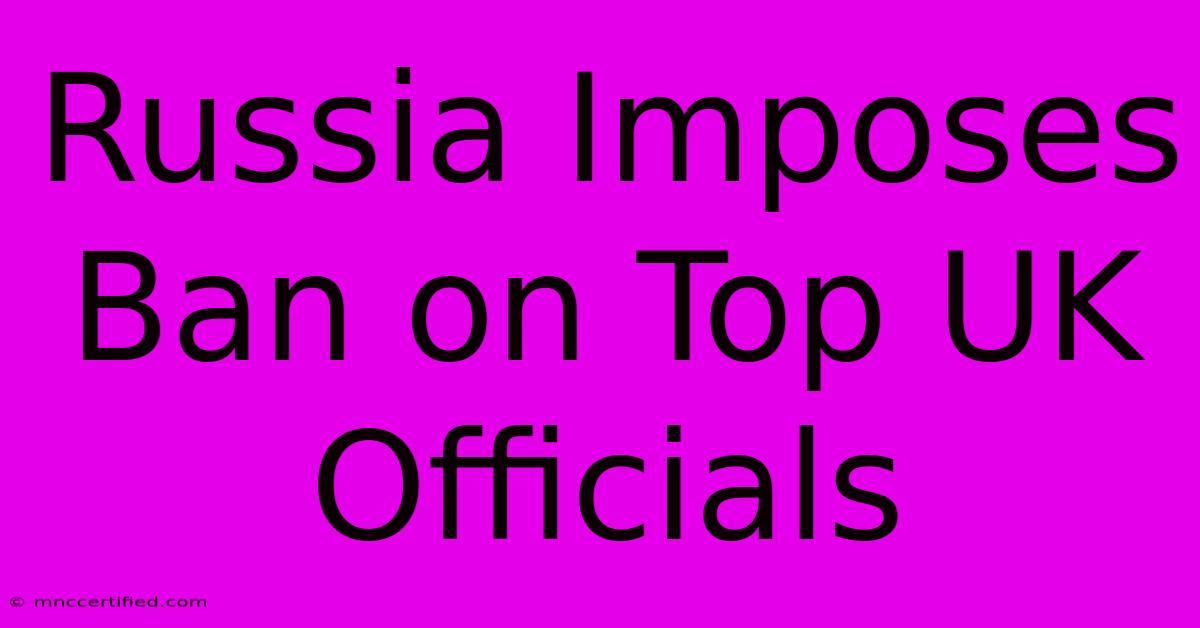Russia Imposes Ban On Top UK Officials

Table of Contents
Russia Imposes Ban on Top UK Officials: A Deep Dive into the Escalating Tensions
Russia's recent ban on a list of prominent UK officials represents a significant escalation in the already strained relationship between the two countries. This action, announced on [Insert Date of Announcement], follows a pattern of reciprocal sanctions and diplomatic expulsions, reflecting a deepening chasm in geopolitical relations. Understanding the context, implications, and potential future ramifications is crucial for navigating the evolving international landscape.
Who is on the Russia's Sanctions List?
The Russian government's sanction list targets key figures within the UK establishment. While the exact composition of the list may vary depending on the source, it notably includes several high-ranking officials, such as:
- [Name and Title of Official 1]: Often cited as a key figure in [Relevant Policy Area]. Their inclusion highlights Russia's concerns regarding [Specific Policy or Action].
- [Name and Title of Official 2]: Known for their [Relevant Characteristic or Role] relating to [Area of Conflict]. Their presence on the list underscores the escalating nature of the dispute.
- [Name and Title of Official 3]: A prominent figure in [Relevant Field], their inclusion suggests a broader strategy targeting [Specific Sector or Influence].
This list is not exhaustive, and the exact individuals named may vary depending on the reporting source. It's important to consult multiple reputable news outlets for the most up-to-date and comprehensive information.
The Reasons Behind Russia's Actions: Unpacking the Geopolitical Context
Russia's decision to impose sanctions on these UK officials stems from a complex interplay of factors, deeply rooted in the ongoing geopolitical tensions between the two nations. Key contributing factors include:
- The Ukraine Conflict: The ongoing war in Ukraine is the primary driver of the deteriorating relationship. Russia views the UK's support for Ukraine, including military aid and economic sanctions, as a direct provocation.
- Allegations of Interference: Russia frequently accuses the UK of interfering in its internal affairs, citing alleged support for opposition groups and attempts to destabilize the Russian government.
- Reciprocal Sanctions: The ban on UK officials is largely a retaliatory measure following similar sanctions imposed by the UK on Russian individuals and entities. This tit-for-tat approach has become a hallmark of the increasingly hostile relationship.
Analyzing the Impact: Short-Term and Long-Term Consequences
The implications of Russia's sanctions extend beyond the individuals directly affected. The action is likely to:
- Further Strain Relations: The move will undoubtedly exacerbate the already tense relationship between the two countries, making diplomatic engagement and cooperation even more challenging.
- Limit Diplomatic Engagement: The sanctions may restrict the ability of sanctioned officials to travel to Russia or engage in official interactions with Russian counterparts.
- Escalate the Information War: The ban is likely to fuel further rhetoric and accusations between both countries, intensifying the ongoing information war.
Long-term consequences remain uncertain but could include:
- Increased Economic Isolation: Continued escalation could lead to further economic sanctions and restrictions, impacting trade and investment between the UK and Russia.
- Heightened Geopolitical Instability: The deteriorating relationship adds to broader global instability, potentially influencing relations with other countries.
What Happens Next? Potential Future Developments
Predicting the future trajectory of UK-Russia relations is inherently difficult. However, several potential developments warrant consideration:
- Further Reciprocal Sanctions: The UK might respond with further sanctions on Russian officials or entities, escalating the cycle of retaliation.
- Diplomatic Efforts: Despite the strained relationship, there is always the potential for diplomatic efforts to de-escalate tensions, although the likelihood of success remains uncertain.
- Continued Tensions: The most probable scenario is a continuation of heightened tensions and mutual distrust, with limited prospects for significant improvement in the near future.
The situation remains fluid and requires continuous monitoring. Staying informed through reputable news sources and analytical reports is crucial for understanding the evolving dynamics of this important geopolitical relationship. The ongoing tensions between Russia and the UK serve as a stark reminder of the complexities and challenges of international relations in the 21st century.

Thank you for visiting our website wich cover about Russia Imposes Ban On Top UK Officials. We hope the information provided has been useful to you. Feel free to contact us if you have any questions or need further assistance. See you next time and dont miss to bookmark.
Featured Posts
-
Injury Free Kimpembe In Psg Squad
Nov 27, 2024
-
Unc Football Coaching Search 10 Potential Coaches
Nov 27, 2024
-
Mr Cooper Not Paying Insurance
Nov 27, 2024
-
Three Goal Lead Lost Man City Vs Feyenoord
Nov 27, 2024
-
Gilbert Arizona Auto Insurance
Nov 27, 2024